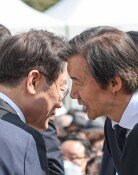Wage reform committee should introduce merit-based pay system
Wage reform committee should introduce merit-based pay system
Posted February. 04, 2023 08:00,
Updated February. 04, 2023 08:00
The wage reform committee for the co-existence of labor and management was inaugurated Thursday to transition the current pay system into a merit-based system and improve the labor market structure. The committee is a panel for social dialogue that will provide a solution to wage reform, which is one of the incumbent government’s labor reform goals. The committee plans to announce measures to support companies seeking to improve their wage system in April and present a roadmap to spread a wage system designed for co-existence and co-prosperity in September.
Experts have long suggested that Korea amend the Korean-style seniority-based wage system, which fails to reflect labor productivity properly and lacks flexibility. A person employed for 30 years at a Korean conglomerate is paid an average of 2.87 times the salary of a first-year employee. The gap is way bigger than that in Japan, which is 2.27 times, and European Union, which stands at 1.65 times. It is because companies in the West are widely using compensation plans based on vocational difficulties and achievements, while Japan, considered the origin of the seniority-based pay system, is fast transitioning into the merit-based system.
The merit-based pay system, which is outdated, has spawned a flurry of side effects. As companies seek to reduce employment of high-paid middle-aged workers whose labor productivity has declined, early retirement of workers in their late 40s and early 50s is relatively common in Korea. As conglomerates and state-run companies, which cannot afford to lay off due to resistance by the labor union, have reduced employment of younger workers, workforce in those companies are increasingly aging. Even so, more than 62 percent of employers with 300 employees are still using the seniority-based pay system.
The Korean labor market is divided between regular and non-regular employees, between contractors and their subcontractors, and conglomerates and small and medium-sized companies. Such a divide is a chronic disease afflicting the Korean economy. While regular employees who are protected by hardline labor unions and employees at contractors have enjoyed rapid wage hikes, non-regular employees and employees at subcontractors are struggling to make ends meet due to low wages. The average monthly salary of regular employees amounted to 3.48 million won (2,820 U.S. dollars) during June – August last year, while that of non-regular employees came to 1.88 million won (1,530 dollars), resulting in a wage gap of whopping 1.6 million won (1,300 dollars). The difference is the largest ever since the introduction of related statistics. The average salary for regular workers at SMEs amounts to only 60 percent of that for regular workers at conglomerates.
The wage reform committee for the co-existence of labor and management said it would consider providing tax incentives to companies introducing the merit-based wage system and disincentives to firms that stick to the seniority-based wage system. By responding to demands by younger generation workers in their 20s and 30 for ‘salary corresponding to merit,’ the committee should come up with practical measures to improve the working conditions for non-regular workers and subcontractors’ employees. For its part, the government should accelerate the merit-based wage system at state-run companies and introduce a fair wage system that provides compensations commensurate with achievements for government employees.







